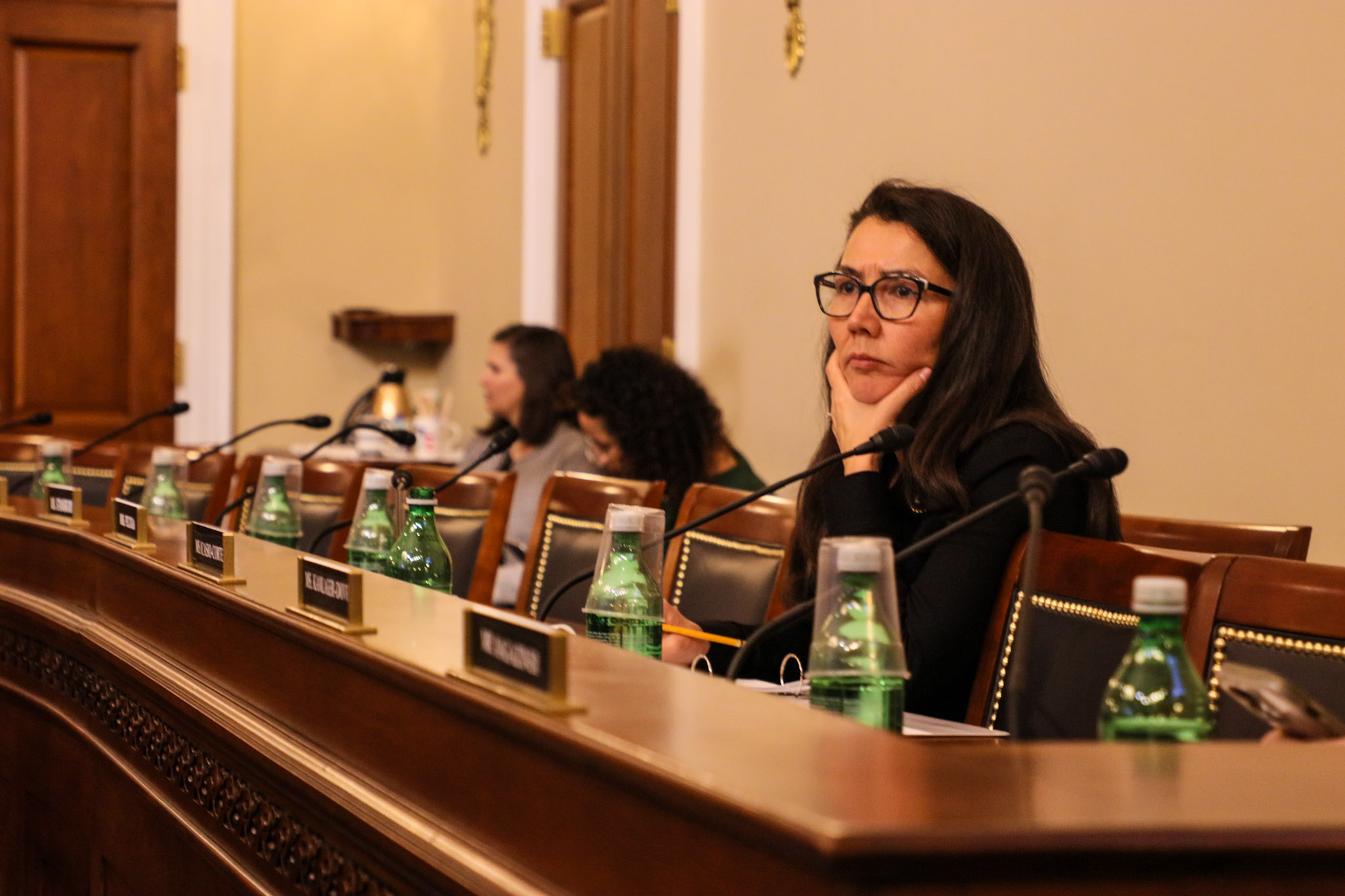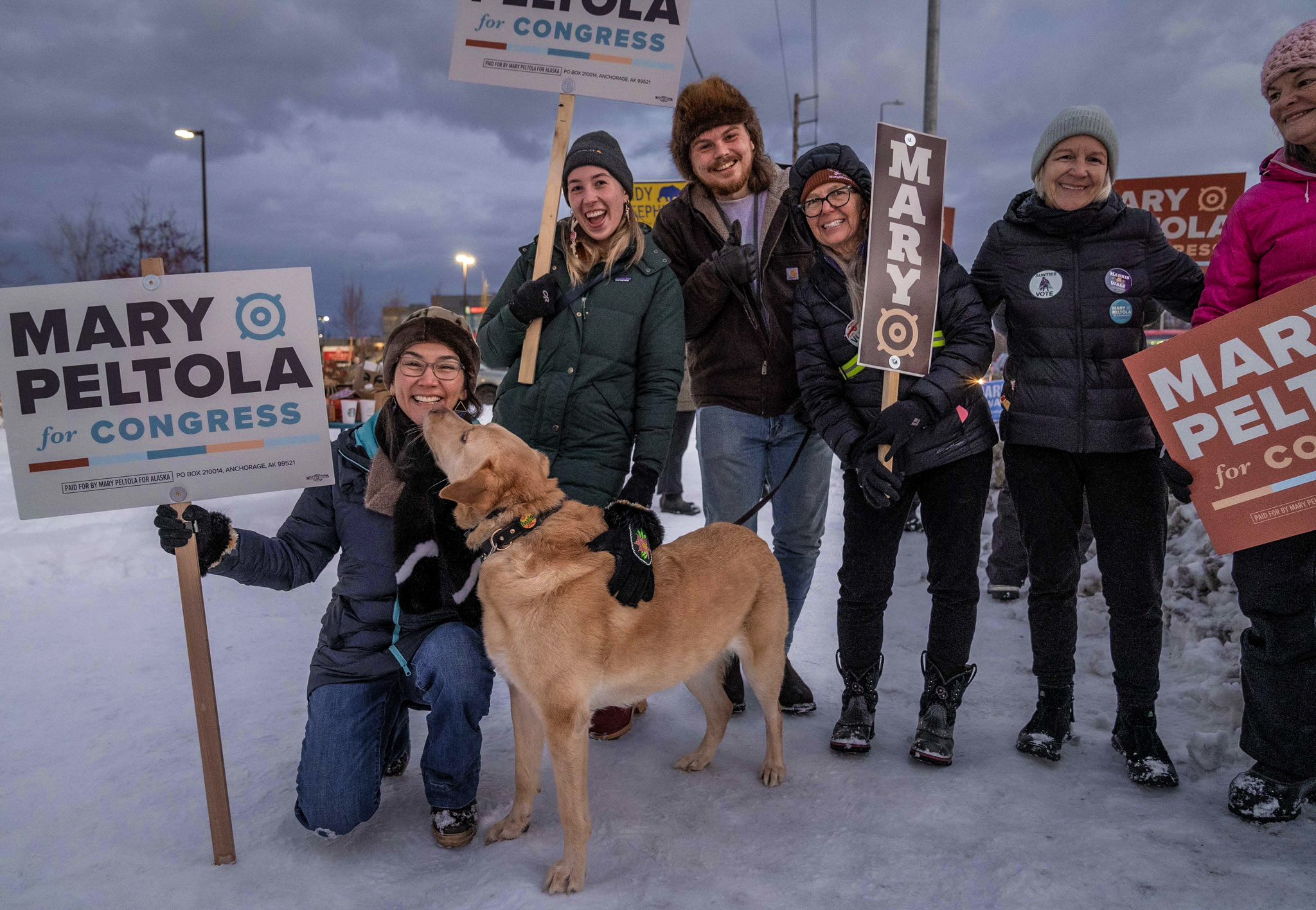Indianz.Com >
News > Alaska Native bills on agenda amid limbo in Congressional race
House Committee on Natural Resources:
Full Committee Markup – November 20, 2024
Alaska Native bills on agenda amid limbo in Congressional race
Tuesday, November 19, 2024
By Acee Agoyo
Indianz.Com
With Alaska’s Congressional race officially in the air,
Rep. Mary Peltola (D-Alaska) is back at work as the first — and perhaps last, at least for now — Alaska Native lawmaker on Capitol Hill.
Ballots are still being counted in Alaska, where
Peltola made history as the first Native person to represent the state in the
U.S. House of Representatives and the first Democrat to do so in 50 years. But her Republican opponent,
Nick Begich, has already declared victory and is planning his move to the nation’s capital.
“The race for Alaska’s sole seat in the U.S. House of Representatives has now been called — Alaskans have spoken,” Begich asserted in a
post on social media on Saturday. “It will be the honor of a lifetime to have the opportunity to serve as your voice in Congress.”
Peltola, however, has not conceded. In a message to supporters the day before Begich pronounced himself the winner, she voiced confidence about her future in a state where Native people make up about 15 percent of the population.
“My team and I are feeling good about where things are, and we’re confident that my share of the vote will continue to grow as the thousands of remaining ballots are counted,” Peltola, who is Yup’ik, said in a message disseminated by
Emily’s List, a group dedicated to electing Democratic, pro-choice women candidates.

Native Vote
And following the November 5 election, Peltola returned to Washington, D.C., where a
bipartisan geothermal energy bill she is co-sponsoring has gained momentum.
H.R.7409, the Harnessing Energy At Thermal Sources Act, cleared the chamber by a
vote of 225 to 181 last Thursday.
“In Alaska, we understand better than most the need to meet energy needs while reducing costs,”
Peltola said, echoing a message she has pushed on the campaign trail ever since she won her first two elections in 2022.
Peltola’s legislative agenda is again moving forward this week. On Wednesday morning, the
House Committee on Natural Resources is set to approve three of her bills at a markup session.
All three bills benefit Alaska Natives and their communities. The list includes
H.R.2687, which resolves a long-standing issue facing Alaska Natives who are elderly, blind or living with disabilities.
H.R.2687 amends the
Alaska Native Claims Settlement Act (ANCSA) to ensure that Alaska Natives who are elderly, blind or disabled are not punished when they seek federal assistance. Currently, any resources provided by their Native corporations counts against them — for everything from Social Security programs to food benefits.
“Our Elders and our disabled shareholders should not have to choose between healthcare and receiving a distribution that will allow them to pay their bills each month,”
Sheri Buretta, the chair of the board for the
Chugach Alaska Corporation, said in testimony to the
House Subcommittee on Indian and Insular Affairs on
April 30.
The outgoing administration of President Joe Biden, a Democrat, is backing the measure. The office of Assistant Secretary for Indian Affairs Bryan Newland, a political appointee at the
Department of the Interior, provided a statement to the subcommittee back in April, noting that
ANCSA required Native people to relinquish their rights to millions of acres of their homelands.
“H.R.2687 represents a commonsense approach to ensure Alaska Native citizens in need of assistance resources are not foreclosed from the federal programs that are designed to help them,” Newland’s office
said in supporting the bill. “Nor, are they foreclosed from utilizing resources available at the Alaska Native community level — resources to which they are rightfully entitled as compensation for the extinguishment of Alaska Native land claims throughout the entire state of Alaska.”
Also on the agenda for the markup is
H.R.4748, the Unrecognized Southeast Alaska Native Communities Recognition and Compensation Act. The bill addresses another long-standing issue of certain Native villages being excluded from ANCSA, which became law in 1971.
“I was a child when ANCSA passed,”
Richard Rinehart, who is Tlingit and Haida, said in testimony on December 5, 2023. “The legislation was debated around my kitchen table.”
“This legislation is deeply personal to me, as it will rectify the injustice that the Native people from my community — along with those from the four other landless communities — have faced for more than 50 years,” Rinehart said of the five Native villages in Southeast Alaska that would finally be able to reclaim land owed to them through the settlement law.
According to the
Bureau of Land Management, another agency at Interior, H.R.4748 would assign a total of 23,040 acres to the Southeast Native communities of Haines, Ketchikan, Petersburg, Tenakee and Wrangel. The subsurface rights under those lands would be transferred to
Sealaska, a regional Native corporation.
“The BLM appreciates the sponsor’s efforts to resolve this long-standing dispute,” the agency said of Peltola’s bill in a
statement for the record.
The final Peltola bill being considered at the markup is
H.R.6489, the Alaska Native Village Municipal Lands Restoration Act of 2023. The measure addresses yet another long-standing ANCSA issue where Native corporations are unable to utilize lands that are being held by the state government in anticipation of municipalities that the Native communities have not agreed to establish.
“It is evident that, for many remote Native Villages in Alaska, forming a municipality is not foreseeable,”
Alaska Federation of Natives President
Ben Mallott, then serving as a vice president of the organization, said in testimony on July 24.
According to Mallott, 83 Native communities have their lands “tied up” by the state of Alaska, totaling about 11,550 acres. Passage of H.R.6489 would “empower Alaska Native corporations and communities to make informed decisions about best utilizing their lands and resources, leading to greater economic prosperity and self-sufficiency,” AFN said in its written statement.
The BLM testified in support of the goals of Alaska Native Village Municipal Lands Restoration Act when
S.2615, the
U.S. Senate version of the bill, was
heard by the Senate Committee on Energy and Natural Resources last year. The agency’s more recent
statement on H.R.6489, however, suggested changes to the bill in order to address concerns raised by tribal governments, who could also be entitled to the lands being held by the state.
According to the
Republican-drafted markup memo for Wednesday’s session before the House Committee on Natural Resources, no amendments to H.R.6489 have been offered. H.R.6489 is instead expected to be approved by unanimous consent, along with H.R.2687 and H.R.4748, her other two measures.
Approval of all three bills by the committee clears them for passage by the full House of Representatives. But time is running out for Peltola to achieve success, with the 118th Congress set to conclude by the end of December.
None of the three bills have been approved by the Senate either, a requirement before any can be signed into law by President Biden. The companion versions [
S.623,
S.1889 and
S.2615] are all being sponsored by
Sen. Lisa Murkowski (R-Alaska), who despite being a Republican, endorsed Peltola in her bid for re-election.
“I look at her as one who is committed to issues that are important to the people of Alaska, and I think it’s important that those interests are represented back in Washington, D.C.,” Murkowski said of Peltola at the Alaska Federation of Natives convention in Anchorage last month.
 Rep. Mary Peltola (D-Alaska) is the first Alaska Native to serve in the U.S. Congress. Photo courtesy House Committee on Natural Resources, Democrats
Rep. Mary Peltola (D-Alaska) is the first Alaska Native to serve in the U.S. Congress. Photo courtesy House Committee on Natural Resources, Democrats
In addition to Peltola’s bills, another measure of interest in Indian Country is on the agenda for Wednesday’s markup session.
H.R.7516, the Purchased and Referred Care Improvement Act of 2024, would help address a long-running issue at the
Indian Health Service.
Due to chronic underfunding, the IHS is not able to provide care to every American Indian or Alaska Native who seeks services. So the agency has to refer them to outside providers for further treatment.
However, the
Purchased/Referred Care program is not able to guarantee payment to the outside providers. That means American Indians and Alaska Natives are left on the hook for services that are promised to them under the federal government’s trust and treaty responsibilities.
“IHS often falls short in its obligation to pay medical bills from Purchased/Referred Care in a timely manner and Native Americans are often forced to pay the bills they don’t owe, or else risk taking substantial hits to their credit, hindering their ability to get a loan, buy a home, and more,” said
Rep. Dusty Johnson (R-South Dakota), the sponsor of H.R.7516.
Tribes and tribal organizations testified in favor of Johnson’s bill at a
hearing on April 30. The
Department of Health and Human Services, the parent agency of IHS, did not outright support or oppose the measure but agreed that medical debt is a major issue for American Indians and Alaska Natives.
“Patients should not be forced into collections because of unpaid medical bills.
American Indians and Alaska Natives — who already suffer disproportionately low life expectancies and disproportionate disease burden — should not be put at financial risk for seeking medical treatment,” Melanie Anne Egorin, the Assistant Secretary for Legislation at HHS, said in written testimony.
As with the Alaska Native bills, H.R.7516 is expected to approved on Wednesday by unanimous consent. The process is typically used for measures that are considered non-controversial and which often enjoy bipartisan backing.
But like its Alaska counterparts, H.R.7516 has not seen movement in the Senate. The companion version is
S.3797 and it too has
bipartisan sponsors.
Should any of the bills fail to get over the finish line by the end of 2024, they would need to be reintroduced in the next session of Congress. The 119th Congress is scheduled to begin on January 3, 2025, with the House and the Senate controlled by the Republican party, whose
leaders are promising an agenda focused on president-elect Donald Trump’s priorities.
The markup session takes place at 10:30am Eastern in Room 1324 of the Longworth House Office Building. A total of 23 bills are on the agenda.
House Committee on Natural Resources Documents
Full Committee Markup (naturalresources.house.gov)
Markup of H.R. 2687, H.R. 4748, H.R. 6489, H.R. 7516 and more
(docs.house.gov)
House Committee on Natural Resources Notices
Legislative Hearing on H.R. 4524, H.R. 4748, H.R. 6368 and H.R. 6443 (December 5, 2023)
Legislative Hearing on H.R. 2687 and H.R. 7516 (April 30, 2024)
Legislative Hearing on H.R. 6489, H.R. 8942, H.R. 8955 & H.R. 8956 (July 24, 2024)
House Committee on Natural Resources Press Releases
Committee Considers Solutions for Tribal Health Care, Individual Tribal Eligibility for Need-Based Federal Programs (April 30, 2024)
Hearing Examines Legislation to Improve Indian Healthcare System and Facilitate Land Transfers (July 24, 2024)

